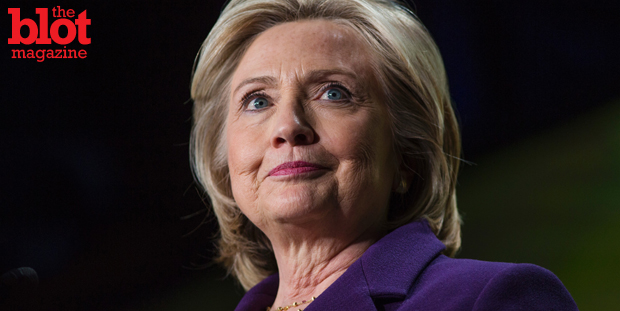
In the most recently released polls, Hillary Clinton is flagging, reaching favorability levels below 50 percent for the first time since March 2007.
The drop in favorability could make Clinton a little hot under the collar of her uniform-like pantsuits that she wears ubiquitously, but her campaign remains calm and is not taking the decline too seriously, believing the shrinking numbers are not cause to worry.
The Clinton camp has countered by opining, somewhat counterintuitively, that Hillary lost some momentum once her official campaign was declared. This is because, they believe, of the thorny transition from her role as nonpartisan mediator while Secretary of State to partisan candidate for the White House.
For Clinton, maybe being the Democratic front-runner isn’t such a good thing. With the 2016 presidential election still 18 months away, it’s early, but two current polls — one from The Washington Post-ABC News, the other by CNN-ORC International — show her favorability steadily slipping since reaching its zenith at 69 percent in September 2011. At that time, she was polling only 26 percent unfavorable.
In the two most recently completed polls, respondent’s opinions of Clinton had significantly soured. With the 2011 high point in the rearview, she has now slipped to 46 and 45 percent favorable among voters queried. Even though her campaign is projecting confidence, many strategists are surprised she has fallen so far so fast. Clinton remains the presumptive Democratic presidential nominee, but the declining poll numbers might point to difficulties ahead.
Read more: Did Hillary Switch Teams on LGBT Rights?
Some of the polls show Clinton losing support among independents and centrist Republicans, which could open a door for former New York City Mayor Michael Bloomberg to step through. To run against Clinton, Bloomberg would have to switch his unaffiliated political registration to Democratic. But that is something Bloomberg is willing to do, he’s said. No matter his chosen party affiliation at the moment — or if/when he declares a campaign — Bloomberg running could take independent voters away from Clinton’s centrist pool.
Democratic challengers, Sen. Bernie Sanders of Vermont and former Maryland Gov. Martin O’Malley, will surely throw their hardest hooks to bruise Hillary from the left in a primary fight, which will pander to the liberal wing of the party. And Clinton will not only have to defend her left in the primary and beyond. This delicate dance leading up to the general election also can’t dip Clinton too far left because she will need to court independent voters and moderate Republicans to carry swing states like Florida and Ohio.
Despite her drop in favorability, in primary polling for the likely party nominee, Clinton still trounces her Democratic opponents. A Fox News poll has Clinton with a commanding 46-point lead over Sanders and a 53-point advantage over O’Malley.
And head-to-head, in a potential general election race, Clinton also bests yet undeclared former Florida Gov. Jeb Bush with an eight-point advantage — 51 percent to 43 — a CNN poll found.
The Iowa caucuses are still six months away, and voters have all that time to select sides, but current polls are not shaping up as Clinton may have hoped. Her campaign announcement was made purposefully low-key in order to capitalize as much as possible on the goodwill earned while Secretary of State, but that tank has apparently drained really fast.
In addition to the fact that Clinton has now fully entered the political fray of a partisan contest, the drop in polls is likely a combination of elements. Her deficits remain many and include the e-mail scandal, in which she used a personal account instead of a State Department server. Plus, she was Secretary of State within the Obama administration during the terrorist attack on the U.S. embassy in Libya, and voters have ongoing unease with her and husband Bill’s Clinton Foundation, and its shady cadre of donors.
It’s a good thing that voters have more than year to sort this whole mess out. At least registered Democrats know who the three major Democratic candidates are, which is more than can be said for the Republicans, who are seemingly running anybody and everybody for the White House.
Noah Zuss is a reporter for TheBlot Magazine.





